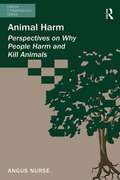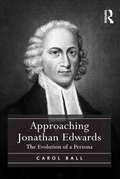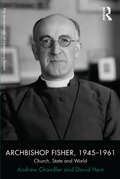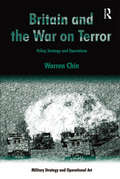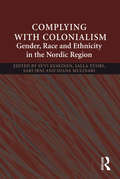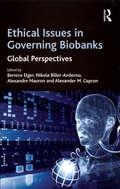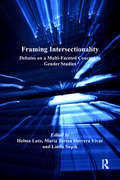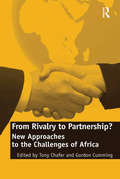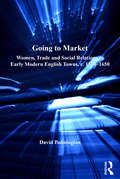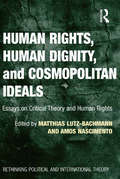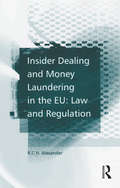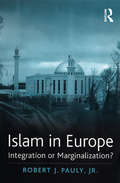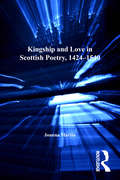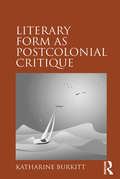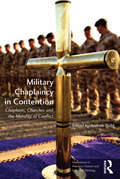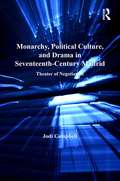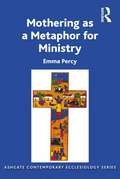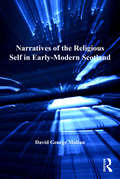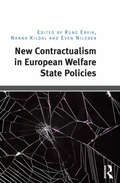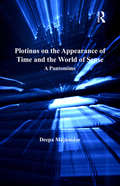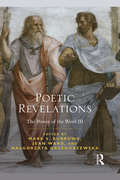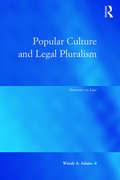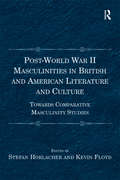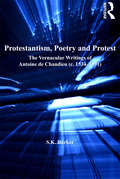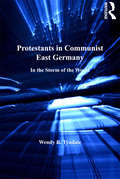Special Collections
Benetech’s Global Certified Accessible Titles
Description: Benetech’s GCA program is the first independent third-party EPUB certification to verify ebook accessibility. By creating content that is born accessible, publishers can meet the needs of all readers. Learn more: https://bornaccessible.benetech.org/
- Table View
- List View
Animal Harm
by Angus NurseWhy do people harm, injure, torture and kill animals? This book evaluates the reasons why these crimes are committed and outlines the characteristics of the animal offender. It considers ethical and value judgements made about animals and the tacit acknowledgement and justification of unacceptable criminal behaviour towards the harming of animals made by offenders. Situating animal abuse, wildlife crime, illegal wildlife trading and other unlawful activities directed at animals firmly within Green Criminology, the book contends that this is a distinct, multi-dimensional type of criminality which persists despite the introduction of relevant legislation. Taking a broad approach, the book considers the killing and harming of animals in an international context and examines the effectiveness of current legislation, policy and sentencing. Including a section on further reading and useful organizations, this book is a valuable exploration into perspectives on the responsibility owed by man to animals as part of broader ecological and legal concerns. It will interest criminologists, ecologists, animal protectionists and those interested in law and society and law and the environment.
Approaching Jonathan Edwards
by Carol BallExploring the inner motivations of one of America’s greatest religious thinkers, this book analyses the ways in which Jonathan Edwards' intense personal piety and deep experience of divine sovereignty drove an introverted intellectual along a course that would eventually develop into a mature and respected public intellectual. Throughout his life, the tension between his innately contemplative nature and the active demands of public office was a constant source of internal and public strife for Edwards. Approaching Jonathan Edwards offers a new theoretical approach to the study of Edwards, with an emphasis on his writing activity as the key strategy in shaping his legacy. Tracing Edwards’ strategic self-fashioning of his persona through the many conflicts in which he was engaged, the critical turning points in his life, and his strategies for managing conflicts and crises, Carol Ball concludes that Edwards found his place as a superlative contemplative apologist and theorist of experiential spirituality.
Archbishop Fisher, 1945–1961
by David Hein and Andrew ChandlerArchbishop Fisher’s archiepiscopate reflected the central issues of his time and place. It was Fisher who oversaw an immense programme of reforms which effectively recast the institutions of the Church of England for generations to come. It was Fisher who proved to be the essential architect, politician and diplomat behind the creation of a worldwide Anglican Communion. His determination to promote the development of relations with other churches produced a vital contribution to the cause of ecumenism, which culminated in his momentous meeting with Pope John XXIII. Archbishop Fisher was a vigorous participant in the questions which defined national and international life. This book explores Fisher’s influence on major contemporary issues and events, including divorce-law reform and capital punishment at home and the end of Empire and the most dangerous years of the Cold War abroad. This new biography establishes the continuing significance not only of the office of Archbishop in the Church but also of the Church at large in the tumultuous world of the later twentieth century. A final section of original source material includes letters, sermons and other writings bringing vividly to life the range and character of Fisher's public and private role.
Britain and the War on Terror
by Warren ChinWhy did Britain come to play such a prominent role in the war on terror and why did the military instrument come to be the dominant theme in the British prosecution of what was an ideological and political struggle? This book is an analysis of Britain’s war against Al Qaeda and the phenomenon of international terrorism which marked a paradigm shift in the nature and conduct of war in the twenty-first century. At the heart of the book is an attempt to understand why Britain, which possessed a wealth of experience in the conduct of counterterrorism, counterinsurgency and small wars, developed a strategic and operational design to defeat the Islamist threat which proved to be deeply flawed. In addressing this question the book explores the complex intellectual, doctrinal and geopolitical challenge posed by Al Qaeda and international terrorism and how and why the British response took the form that it did. In conducting this analysis the book raises important questions about the assumptions and perceptions of those in government who led the UK into this conflict, the nature of the civil military relationship in Britain and how well it functioned, and finally the competence of its security forces in being able to deal with this threat both domestically and overseas.
Complying With Colonialism
by Diana Mulinari and Suvi Keskinen and Salla Tuori and Sari IrniComplying with Colonialism presents a complex analysis of the habitual weak regard attributed to the colonial ties of Nordic Countries. It introduces the concept of ’colonial complicity’ to explain the diversity through which northern European countries continue to take part in (post)colonial processes. The volume combines a new perspective on the analysis of Europe and colonialism, whilst offering new insights for feminist and postcolonial studies by examining how gender equality is linked to ’European values’, thus often European superiority. With an international team of experts ranging from various disciplinary backgrounds, this volume will appeal not only to academics and scholars within postcolonial sociology, social theory, cultural studies, ethnicity, gender and feminist thought, but also cultural geographers, and those working in the fields of welfare, politics and International Relations. Policy makers and governmental researchers will also find this to be an invaluable source.
Ethical Issues in Governing Biobanks
by Nikola Biller-Andorno and Alexander M. CapronPopulation genomics research drawing on genetic databases has expanded rapidly, with some of this information being combined in 'biobanks'. Managing this information in an appropriate way is a highly complex ethical issue in the health policy arena. This book combines theoretical and empirical research to analyze the areas of conflict and consensus in the regulatory and ethical frameworks that have been developed to govern biobanks. Ethicists from the Department of Ethics, Trade, Human Rights and Health Law (ETH) of the World Health Organization, the Institute of Biomedical Ethics of Geneva University and the Institute of Biomedical Ethics of the University of Zurich, with the support of the Geneva International Academic Network (GIAN), examine the conditions under which genetic databases can be established, kept, and made use of in an ethically acceptable way. In addition to a comprehensive review of the scientific literature and a comparative analysis of existing normative frameworks, they present the results of in-depth interviews with experts around the world concerning the most unresolved and controversial issues. The results of that study, combined with their normative analysis, leads to recommendations for a better international framework.
Framing Intersectionality
by Linda Supik and Helma Lutz and Maria Teresa Herrera VivarOriginally conceived by Kimberlé Crenshaw in 1989 as a tool for the analysis of the ways in which different forms of social inequality, oppression and discrimination interact and overlap in multidimensional ways, the concept of 'intersectionality' has attracted much attention in international feminist debates over the last decade. Framing Intersectionality brings together proponents and critics of the concept, to discuss the 'state of the art' with those that have been influential in the debates that surround it. Engaging with the historical roots of intersectionality in the US-based 'race-class-gender' debate, this book also considers the European adoption of this concept in different national contexts, to explore issues such as migration, identity, media coverage of sexual violence against men and transnational livelihoods of high and low skilled migrants. Thematically arranged around the themes of the transatlantic migration of intersectionality, the development of intersectionality as a theory, men's studies and masculinities, and the body and embodiment, this book draws on empirical case studies as well as theoretical deliberations to investigate the capacity and the sustainability of the concept and shed light on the current state of intersectionality research. Presenting the latest work from a team of leading feminist scholars from the US and Europe, Framing Intersectionality will be of interest to all those with interests in gender, women's studies, masculinity, inequalities and feminist thought.
From Rivalry to Partnership?
by Gordon Cumming'From Rivalry to Partnership' is the first to study a potentially valuable way forward in tackling the challenges of Africa, namely bilateral partnerships. The book evaluates the significance and strength of the emerging Anglo-French partnership and explores how far this and other forms of 'bilateral' and 'bi-multi' cooperation might serve as a valuable alternative or complement to traditional unilateral and multilateral approaches in Africa. Practitioners, established academic experts as well emerging scholars in the field bring to bear a sophisticated synthesis of neoclassical realism and 'discursive institutionalism' and findings from over 100 research interviews to explore how joint approaches and bilateral partnerships have been used to address the challenges of Africa. In developing this argument, the editors explore: * Anglo-French cooperation in Africa * other bilateral partnerships in Africa, notably the Nordic states and the US * the Africa-EU Strategic Partnership * the China-Africa partnership and its implications for the EU-Africa partnership and for leading European states Written in a clear and accessible style, 'From Rivalry to Partnership' offers a much needed fresh insight into whether and how bilateral partnerships make a real difference to people's lives on the African continent.'
Going to Market
by David PenningtonGoing to Market rethinks women’s contributions to the early modern commercial economy. A number of previous studies have focused on whether or not the early modern period closed occupational opportunities for women. By attending to women’s everyday business practices, and not merely to their position on the occupational ladder, this book shows that they could take advantage of new commercial opportunities and exercise a surprising degree of economic agency. This has implications for early modern gender relations and commercial culture alike. For the evidence analyzed here suggests that male householders and town authorities alike accepted the necessity of women’s participation in the commercial economy, and that women’s assertiveness in marketplace dealings suggests how little influence patriarchal prescriptions had over the way in which men and women did business. The book also illuminates England’s departure from what we often think of as a traditional economic culture. Because women were usually in charge of provisioning the household, scholars have seen them as the most ardent supporters of an early-modern ’moral economy’, which placed the interests of poor consumers over the efficiency of markets. But the hard-headed, hard-nosed tactics of market women that emerge in this book suggests that a profit-oriented commercial culture, far from being the preserve of wealthy merchants and landowners, permeated early modern communities. Through an investigation of a broad range of primary sources-including popular literature, criminal records, and civil litigation depositions-the study reconstructs how women did business and negotiated with male householders, authorities, customers, and competitors. This analysis of the records shows women able to leverage their commercial roles and social contacts to defend the economic interests of their households and their neighborhoods.
Human Rights, Human Dignity, and Cosmopolitan Ideals
by Amos Nascimento and Matthias Lutz-BachmannThis book makes a significant contribution to the on-going international dialogue on the meaning of concepts such as human rights, humanity, and cosmopolitanism. The authors propose a new agenda for research into a Critical Theory of Human Rights. Each chapter pursues three goals: to reconstruct modern philosophical theories that have contributed to our views on human rights; to highlight the importance of humanity and human dignity as a complementary dimension to liberal rights; and, finally, to integrate these issues more directly in contemporary discussions about cosmopolitanism. The authors not only present multicultural perspectives on how to rethink political and international theory in terms of the normativity of human rights, but also promote an international dialogue on the prospects for a critical theory of human rights discourses in the 21st century.
Insider Dealing and Money Laundering in the EU
by R.C.H. AlexanderThis work presents a comparative study of the provisions relating to insider dealing under the EC Insider Dealing Directive. The volume begins with a discussion of the rationale for regulating financial services in general and controlling insider dealing and money-laundering in particular. It examines the definition of an insider and of inside information and the various criminal offenses relating to insider dealing. The role of money-laundering is also recognized and the anti-money laundering regime as well as the considerable impact on the financial sector is discussed in detail. The work assesses the efficacy of criminal law in controlling insider dealing and considers the increasing trend to deal with it by means of civil/administrative measures.
Islam in Europe
by Jr. and Robert J. PaulyIn this timely work, Robert J. Pauly, Jr. looks in detail at the impact of Islam’s presence in Europe. He examines five areas of particular importance: the effect of the growth of Muslim communities on the demographics of Western Europe generally, and France, Germany and the United Kingdom in particular; the consequences of the marginalization of Muslims on domestic and international security within and outside of Western Europe in the post-11 September 2001 era; the impact of the issue of Islam in Europe on the European Union’s ongoing deepening and widening processes; the potential correlation between the increased visibility of Islam in Europe and the growth of far-right political parties across the continent; and the broader relationships between the issues of Islam in Europe, Islam and Europe, and Islam and the West.
Kingship and Love in Scottish Poetry, 1424–1540
by Joanna MartinLooking at late medieval Scottish poetic narratives which incorporate exploration of the amorousness of kings, this study places these poems in the context of Scotland's repeated experience of minority kings and a consequent instability in governance. The focus of this study is the presence of amatory discourses in poetry of a political or advisory nature, written in Scotland between the early fifteenth and the mid-sixteenth century. Joanna Martin offers new readings of the works of major figures in the Scottish literature of the period, including Robert Henryson, William Dunbar, and Sir David Lyndsay. At the same time, she provides new perspectives on anonymous texts, among them The Thre Prestis of Peblis and King Hart, and on the works of less well known writers such as John Bellenden and William Stewart, which are crucial to our understanding of the literary culture north of the Border during the period under discussion.
Literary Form as Postcolonial Critique
by Katharine BurkittFocusing on works by Derek Walcott, Les Murray, Anne Carson, and Bernardine Evaristo, Katharine Burkitt investigates the relationship between literary form and textual politics in postcolonial narrative poems and verse-novels. Burkitt argues that these works disrupt and undermine the traditions of particular forms and genres, and most notably the expectations attached to the prose novel, poetry, and epic. This subversion of form, Burkitt argues, is an important aspect of the texts' postcoloniality as they locate themselves critically in relation to literary convention, and they are all concerned with matters of social, racial, and national identities in a world where these categories are inherently complicated. In addition, the awareness of epic tradition in these texts unites them as 'post-epics', in that as they reuse the myths and motifs of a variety of epics, they question the status of the form, demonstrate it to be inherently malleable, and regenerate its stories for the contemporary world. As she examines the ways in which postcolonial texts rewrite the traditions of classical epics for the twentieth and twenty-first centuries, Burkitt ties close textual analysis to a critical intervention in the politics of form.
Military Chaplaincy in Contention
by Andrew ToddChaplaincy highlights the need for faith and society to re-engage with vital moral questions. Military chaplains continue to operate within the dynamic tension between faith communities, the armed services and society, offering a distinct moral presence and contribution. Drawing the reader into the world of the military chaplain, this book explores insights into the complex moral issues that arise in combat (especially in Afghanistan), and in everyday military life, These include the the increasing significance of the Law of Armed Conflict and the moral significance of drones. Through the unique chaplain’s eye view of the significance of their experience for understanding the ethics of war, this book offers clearer understanding of chaplaincy in the context of the changing nature of international conflict (shaped around insurgency and non-state forces) and explores the response of faith communities to the role of the armed services. It makes the case for relocating understandings of just war within a theological framework and for a clear understanding of the relationship between the mission of chaplaincy and that of the military.
Monarchy, Political Culture, and Drama in Seventeenth-Century Madrid
by Jodi CampbellIn early modern Spain, theater reached the height of its popularity during the same decades in which Spanish monarchs were striving to consolidate their power. Jodi Campbell uses the dramatic production of seventeenth-century Madrid to understand how ordinary Spaniards perceived the political developments of this period. Through a study of thirty-three plays by four of the most popular playwrights of Madrid (Pedro Caldern de la Barca, Francisco de Rojas Zorrilla, Juan de Matos Fragoso, and Juan Bautista Diamante), Campbell analyzes portrayals of kingship during what is traditionally considered to be the age of absolutism and highlights the differences between the image of kingship cultivated by the monarchy and that presented on Spanish stages. A surprising number of plays performed and published in Madrid in the seventeenth century, Campbell shows, featured themes about kingship: debates over the qualities that make a good king, tests of a king's abilities, and stories about the conflicts that could arise between the personal interests of a king and the best interest of his subjects. Rather than supporting the absolutist and centralizing policies of the monarchy, popular theater is shown here to favor the idea of reciprocal obligations between subjects and monarch. This study contributes new evidence to the trend of recent scholarship that revises our views of early modern Spanish absolutism, arguing for the significance of the perspectives of ordinary people to the realm of politics.
Mothering as a Metaphor for Ministry
by Emma PercyDrawing together original research which weaves together ideas from theology, philosophy, feminism and writing on mothering and child development, Emma Percy affirms and encourages aspects of good practice in ministry that are in danger of being overlooked because they are neither well-articulated nor valued. Offering a fresh look at parish ministry, this book uses a maternal metaphor to provide an integrated image of being and doing. The metaphor of mothering is used to explore the relational aspect of parish ministry which needs to value particularity and concrete contingent responsiveness. Percy suggests virtues that need to be cultivated to guard against the temptations to intrusive or domineering styles of care on the one hand or passive abnegation of responsibility on the other. Parish ministry cannot be understood in terms of tangible productivity; different ways of understanding success and evaluating priorities need to be developed. The book suggests ways of being ’good enough’ clergy who can find the right balance between caring for people and communities whilst encouraging and acknowledging the maturity of others.
Narratives of the Religious Self in Early-Modern Scotland
by David George MullanDrawing on a rich, yet untapped, source of Scottish autobiographical writing, this book provides a fascinating insight into the nature and extent of early-modern religious narratives. Over 80 such personal documents, including diaries and autobiographies, manuscript and published, clerical and lay, feminine and masculine, are examined and placed both within the context of seventeenth-century Scotland, and also early-modern narratives produced elsewhere. In addition to the focus on narrative, the study also revolves around the notion of conversion, which, while a concept known in many times and places, is not universal in its meaning, but must be understood within the peculiarities of a specific context and the needs of writers located in a specific tradition, here, Puritanism and evangelical Presbyterianism. These conversions and the narratives which provide a means of articulation draw deeply from the Bible, including the Psalms and the Song of Solomon. The context must also include an appreciation of the political history, especially during the religious persecutions under Charles II and James VII, and later the changing and unstable conditions experienced after the arrival of William and Mary on her father's throne. Another crucial context in shaping these narratives was the form of religious discourse manifested in sermons and other works of divinity and the work seeks to investigate relations between ministers and their listeners. Through careful analysis of these narratives, viewing them both as individual documents and as part of a wider genre, a fuller picture of seventeenth-century life can be drawn, especially in the context of the family and personal development. Thus the book may be of interest to students in a variety of areas of study, including literary, historical, and theological contexts. It provides for a greater understanding of the motivations behind such personal expressions of early-modern religious faith, whose echoes can still be heard today.
New Contractualism in European Welfare State Policies
by Rune Ervik and Nanna KildalThe ’Golden Age' of the welfare state in Europe was characterised by a strengthening of social rights as citizens became increasingly protected through the collective provision of income security and social services. The oil crisis, inflation and high unemployment of the 1970s largely saw the end of welfare expansion with critical voices claiming the welfare state had created an unbalanced focus on the social rights of individuals, above their responsibilities as citizens. During the 1980s many western countries developed contractual modes of thinking and regulation within welfare policy. Contractualism has proved a significant organising principle for public reforms in general, and for social policy reforms in particular as it embraces both a way of justifying certain welfare policies and of constructing specific socio-legal policy instruments. Engaging with both the critique of the welfare state and the subsequent policy responses, expert contributors in this book examine contractualism as a discourse, comprising principles and justifying ideas, and as a legal and social practice. Covering the international debate on conditionality they discuss European experiences with active social citizenship ideas and contractualism providing individual case studies and comparisons from a wide range of European countries.
Plotinus on the Appearance of Time and the World of Sense
by Deepa MajumdarPlotinus (c.205-70) was a Neoplatonist philosopher, his work posthumously published by Porphyry and divided into six books, nine tractates each, called the Enneads. In this book Majumdar makes a valuable addition to the literature on his work, especially Ennead III.7(45)11-13 - in particular explaining Plotinus' cosmology using the genus-species model of soul, coordinating the literature on the appearance of time and the cosmos with that on the larger issue of Plotinian "emanation" and examining the role of tolma and the restless nature of soul in this conjoint appearance. This book investigates Plotinian "emanation," its laws of poiesis (contemplative making ) and the roles of nature, matter, logos, (rational formative principle) and contemplation and highlights the subtler details of Plotinus' cosmology by disentangling conceptual issues about the nature of soul and self ("we") and their impact on the process of generation of time and the cosmos.
Poetic Revelations
by Mark S. Burrows and Jean Ward and Małgorzata GrzegorzewskaThis book explores the much debated relation of language and bodily experience (i.e. the 'flesh'), considering in particular how poetry functions as revelatory discourse and thus relates to the formal horizon of theological inquiry. The central thematic focus is around a 'phenomenology of the flesh' as that which connects us with the world, being the site of perception and feeling, joy and suffering, and of life itself in all its vulnerability.
The voices represented in this collection reflect interdisciplinary methods of interpretation and broadly ecumenical sensibilities, focusing attention on such matters as the revelatory nature of language in general and poetic language in particular, the function of poetry in society, the question of Incarnation and its relation to language and the poetic arts, the kenosis of the Word, and human embodiment in relation to the word 'enfleshed' in poetry.
Popular Culture and Legal Pluralism
by Wendy A AdamsDrawing upon theories of critical legal pluralism and psychological theories of narrative identity, this book argues for an understanding of popular culture as legal authority, unmediated by translation into state law. In narrating our identities, we draw upon collective cultural narratives, and our narrative/nomos obligational selves become the nexus for law and popular culture as mutually constitutive discourse. The author demonstrates the efficacy and desirability of applying a pluralist legal analysis to examine a much broader scope of subject matter than is possible through the restricted perspective of state law alone. The study considers whether presumptively illegal acts might actually be instances of a re-imagined, alternative legality, and the concomitant implications. As an illustrative example, works of critical dystopia and the beliefs and behaviours of eco/animal-terrorists can be understood as shared narrative and normative commitments that constitute law just as fully as does the state when it legislates and adjudicates. This book will be of great interest to academics and scholars of law and popular culture, as well as those involved in interdisciplinary work in legal pluralism.
Post-World War II Masculinities in British and American Literature and Culture
by Stefan Horlacher and Kevin FloydAnalyzing literary texts, plays, films and photographs within a transatlantic framework, this volume explores the inseparable and mutually influential relationship between different forms of national identity in Great Britain and the United States and the construction of masculinity in each country. The contributors take up issues related to how certain kinds of nationally specific masculine identifications are produced, how these change over time, and how literature and other forms of cultural representation eventually question and deconstruct their own myths of masculinity. Focusing on the period from the end of World War II to the 1980s, the essays each take up a topic with particular cultural and historical resonance, whether it is hypermasculinity in early cold war films; the articulation of male anxieties in plays by Arthur Miller, David Mamet and Sam Shepard; the evolution of photographic depictions of masculinity from the 1960s to the 1980s; or the representations of masculinity in the fiction of American and British writers such as Patricia Highsmith, Richard Yates, John Braine, Martin Amis, Evan S. Connell, James Dickey, John Berger, Philip Roth, Frank Chin, and Maxine Hong Kingston. The editors and contributors make a case for the importance of understanding the larger context for the emergence of more pluralistic, culturally differentiated and ultimately transnational masculinities, arguing that it is possible to conceptualize and emphasize difference and commonality simultaneously.
Protestantism, Poetry and Protest
by S.K. BarkerAntoine de Chandieu (1534-1591) was a key figure in the establishment and development of the French Protestant Church. Of all its indigenous leaders, he was perhaps closest to Calvin, and took a leading role in all the major debates about resistance, church order and doctrine of the Church. He was also a prodigious writer of political, religious and poetical works, whose output corresponds to a period of great turmoil in the progress of the French Church. Chandieu was uniquely placed not merely to engage and contribute to the great debates of the day, but also to record ongoing events. By illuminating his career, which meshed almost exactly with the French Wars of Religion, this book not only demonstrates the key role Chandieu's played in the development of French Protestantism, but also highlights the vital role of literature in shaping the religious experience of the wars. Offering the first systematic evaluation of Chandieu's vernacular works, this study questions many of the assumptions made about his motivations and aims, and how these developed over a thirty year period. His writings were contemporaneous with progress in the worlds of politics, theology and poetry, worlds in which he played a notable, if not well-documented, role. As a corpus, these works show the development of one man's understanding of his ideology over a lifetime actively spent in the pursuit of making that ideology a reality. Chandieu the young political hothead became Chandieu the defender of Calvinist theology, who in turn matured into Chandieu the elder statesman. The interest lies in where these changes occurred, how they were reflected in Chandieu's writing, and what they demonstrate about being Calvinist, and a representative of one's faith, in a time of disorder. As such, this book provides not only a reappraisal of the man and his publications, but presents an intriguing perspective on the development of French Protestantism during this turbulent time.
Protestants in Communist East Germany
by Wendy R. TyndaleThis is the story of how the Protestants in the GDR struggled to survive while striving to put their theology into practice and remaining true to their vision of what the role of the church should be - a 'church for others' as Dietrich Bonhoeffer put it. Having taken the reader from the foundation of the GDR, through the peaceful revolution, to the unification of Germany, the story ends with some reflections on the church's past as well as on the challenges it faces in present-day Europe. Protestants in Communist East Germany makes a unique contribution to existing literature by drawing not only on written sources but on a series of first-hand interviews with theologians, pastors and lay people of different ages whose experiences, views and analyses bring the story to life. The East German church's relationship to the state will probably always remain controversial and the vision for a different socialism in the GDR espoused by those involved in the peaceful revolution may now be considered illusory. Nevertheless, many of the issues raised by the Protestants in the GDR remain as vital challenges to the churches in Europe today. Foreword by Paul Oestreicher.
